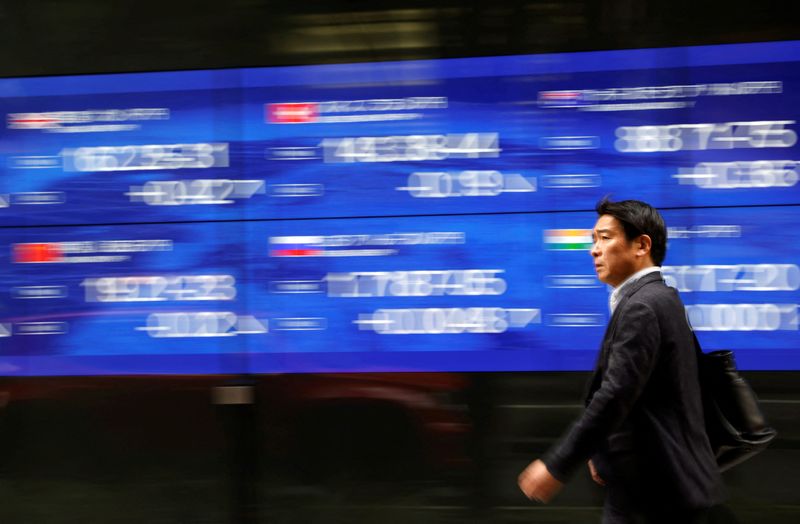Global stocks neared one-month highs on Tuesday, after the Bank of Japan left monetary policy unchanged, bolstering the yen and Japanese stocks, while Chinese equity investors took little heart from speculation of a huge government rescue package.
The MSCI All-World index (.MIWD00000PUS), opens new tab was up 0.2%, near one-month highs, thanks in part to a 3% rebound in Hong Kong stocks (.HSI), opens new tab that slumped the previous day, when foreign outflows gathered pace and short selling surged.
Chinese stocks (.SSEC), opens new tab staged a more muted recovery, having touched their lowest in five years the previous day after the country's cabinet pledged to take more effective measures to stabilise market confidence. One option included mobilising some 2 trillion yuan ($278.53 billion) to support the stock market, according to a Bloomberg News, opens new tab report. Elsewhere, investors have been encouraged by the prospect of falling interest rates in other major economies, including the United States, the euro zone and Britain, which have seen the benchmark U.S. S&P 500 (.SPX), opens new tab officially enter a bull market and Germany's DAX (.GDAXI), opens new tab trade within sight of late 2023's all-time peaks.
Concern about the Chinese economy, where the real estate in particular is under stress, has seen foreign investors take a big step back in the last couple of years. Lombard Odier economist Samy Char said the risk of the kind of aggressive selloff that has hit Chinese markets this week spilling into other parts of the financial world was low, but pain for domestic investors looked inevitable. "It is a surplus economy. There are a lot of savings in the private sector. So there is no risk of financial contagion and the financial system failing," he said.
"They have a sufficient amount of room to manoeuvre and savings to make sure they can prevent a financial accident. What you can't prevent is the fact that you need digest excesses and it means some loss taking," Char added. The yuan staged its biggest one-day rally against the dollar in a month in the offshore market.
Meanwhile, the BOJ kept interest rates in negative territory, but signalled its growing conviction that conditions for phasing out its ultra-loose monetary policy were falling into place, which gave the yen a lift and sent Tokyo's Nikkei (.N225), opens new tab to fresh 34-year highs. The yen headed towards its biggest one-day gain in a month, pushing the dollar down by as much as 0.75% to a session low of 146.99. "For our mind, April is the absolute earliest that they will contemplate a tightening... We actually think the risk is that they end up moving later rather than sooner than April," Ray Attrill, head of FX research at National Australia Bank, said.
Monday's rally on Wall Street that took the S&P 500 to a second consecutive record close did not translate into a rise in European stocks, where the regional STOXX 600 index (.STOXX), opens new tab fell 0.2%, led by declines in pharma and semiconductor stocks. Investors are waiting for earnings from Netflix (NFLX.O), opens new tab later and expectations are generally upbeat. Also due is GE (GE.N), opens new tab.
In currencies, the euro edged up 0.2% against the dollar to $1.0906. The European Central Bank (ECB) meets on Thursday and is expected to hold monetary policy steady. Sterling was up 0.2% at $1.274. The Bank of England meets next week to set interest rates. U.S. Treasury yields edged up as investors took profit from Monday's modest price increase. The yield on the 10-year note was up 3 basis points at 4.122%, while the two-year note traded at 4.395%, up 2 bps. Oil prices were mostly steady on Tuesday after surging 2% overnight as a Ukrainian drone strike on Russia's Novatek (NVTK.MM), opens new tab fuel terminal caused supply disruptions.










